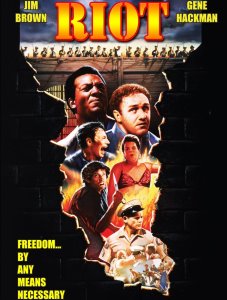
RIOT
US, 1969, 96 minutes, Colour.
Jim Brown, Gene Hackman, Mike Kellin.
Directed by Buzz Kulik.
An interesting and competent prison film. It was directed by Buzz Kulik, a director of many television programmes, telemovies and A wide range of films. It stars Jim Brown at the height of his popularity and Gene Hackman at the beginning of his.
The film takes a tough attitude towards prisons and riots and in criticism of the Establishment. It is based on an ex-convict's (Frank Hill) novel about an incident in a Minnesota prison. The postscript says that the last escapee is still at large. The film is in the tradition of American prison films of the thirties and of Riot in Cell Block Eleven of the fifties. It looks comparatively unsophisticated when linked with films of the seventies and eighties like Brubaker and Escape From Alcatraz. (It also could be compared with the Australian prison film Stir.) The film focuses on the riot and the escape attempt of a small group of prisoners and so is somewhat circumscribed in its scope. However, it highlights the usual prison issues and therefore, reform.
1. The prison film tradition? American prisons? Inmates, abuses, authorities, riots? Escapes? The scope of this film and its quality?
2. How important the social observation made during the film, its being based on fact? The incisiveness of its observation and comment? The need for change in prison style and administration?
3. The film based on fact, prisoners being used in the cast, the Warden playing a warden?
4. The simplicity of the title and its focus, the riot situation, the characters seen within this situation, the crises in interaction, with the guards, the final escape? The personal and social issues in the riot context?
5. The usual introduction to prison films: Grossman and his antagonism towards the men, his picking on Cully? The sudden reversal of roles and the warders imprisoned? Grossman and his cringing? The importance of the imprisoned warders throughout the whole riot?
6. Red Fletcher and his control of the group, a man of anger, his ambitious plan, his henchmen, especially Bugsy? His trying to use Cully? Surefoot and his Indian background, madness, role in the riot? The sequencing of the digging of the tunnel, the gritty detail and hard work? The effect on the group? The select group to escape? The negotiations with the magazine editor? The nature of the grievances? Their being used an a cover? The adaptation by Red to the various circumstances, his overriding ambition to escape?
7. The contrast with Cully - the strong hero type, his background, his being caught in the riot situation, his decision to go along with it? Co-operation, help, part of the planning, of the control?
8. Surefoot and his presence, his madness, digging, the final fight and his going berserk, death? His being responsible for Red's death?
9. The significance of the negotiations and the grievances?
10. The making of the brew, the control of the prisoners, the effect on the prisoners for example, the court, the homosexuals, the prisoners lacking control?
11. The suspense build-up with the digging of the tunnel, the decision about going, the emerging at ground level, the shooting and deaths?
12. The warden and his harsh attitudes? His return? The irony of his being away on holidays and sudden appearance? His aggressive issuing of the attack? The violence?
13. The details of the escape, the fight, Red's death, Cully's escape and the postscript to the film?
14. Prison films and the insight into society, the kind of society that allows prisons to be like this? The need for reform, justice for prisoners to pay their debt to society with some dignity? The exercise of authority by wardens and guards? A significant kind of social entertainment?